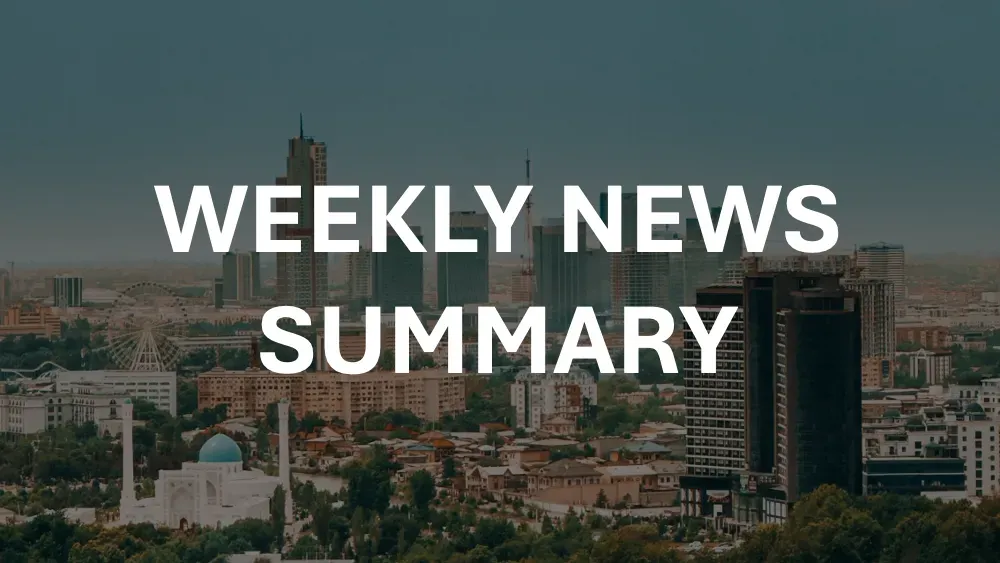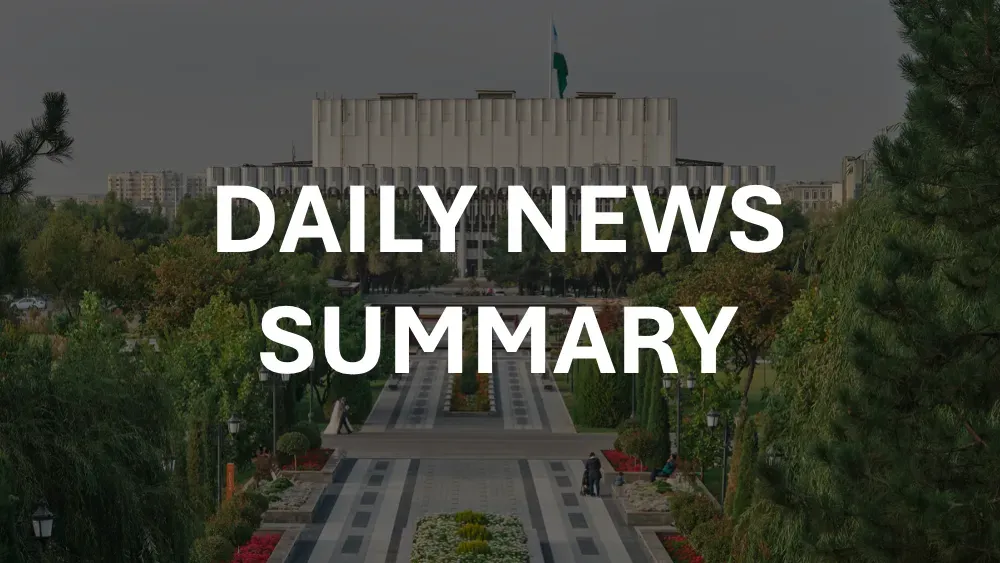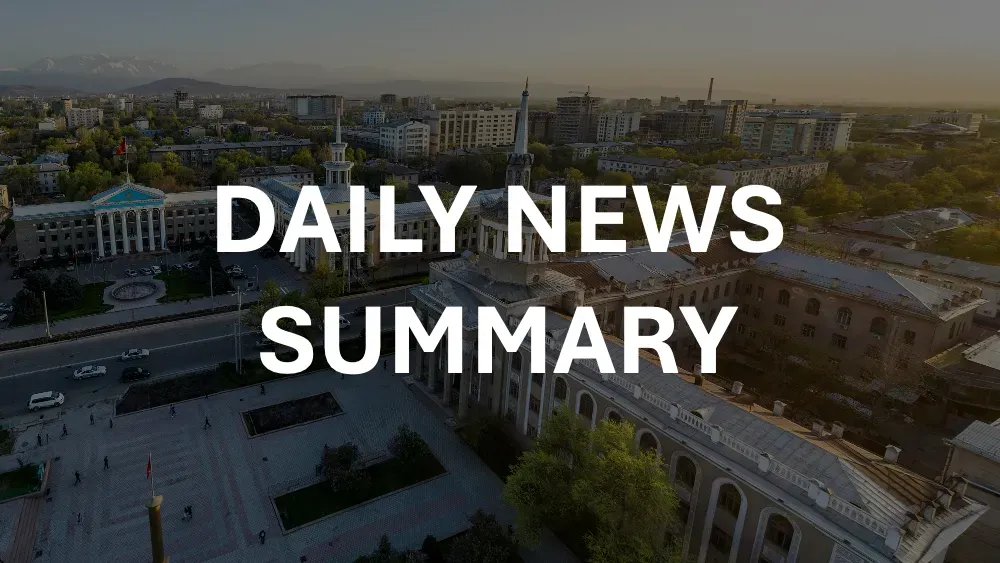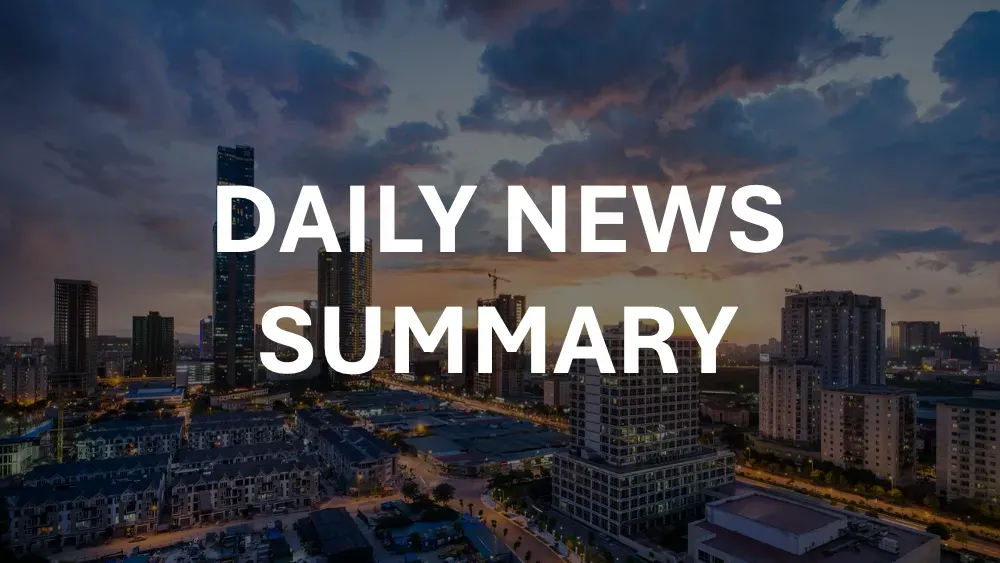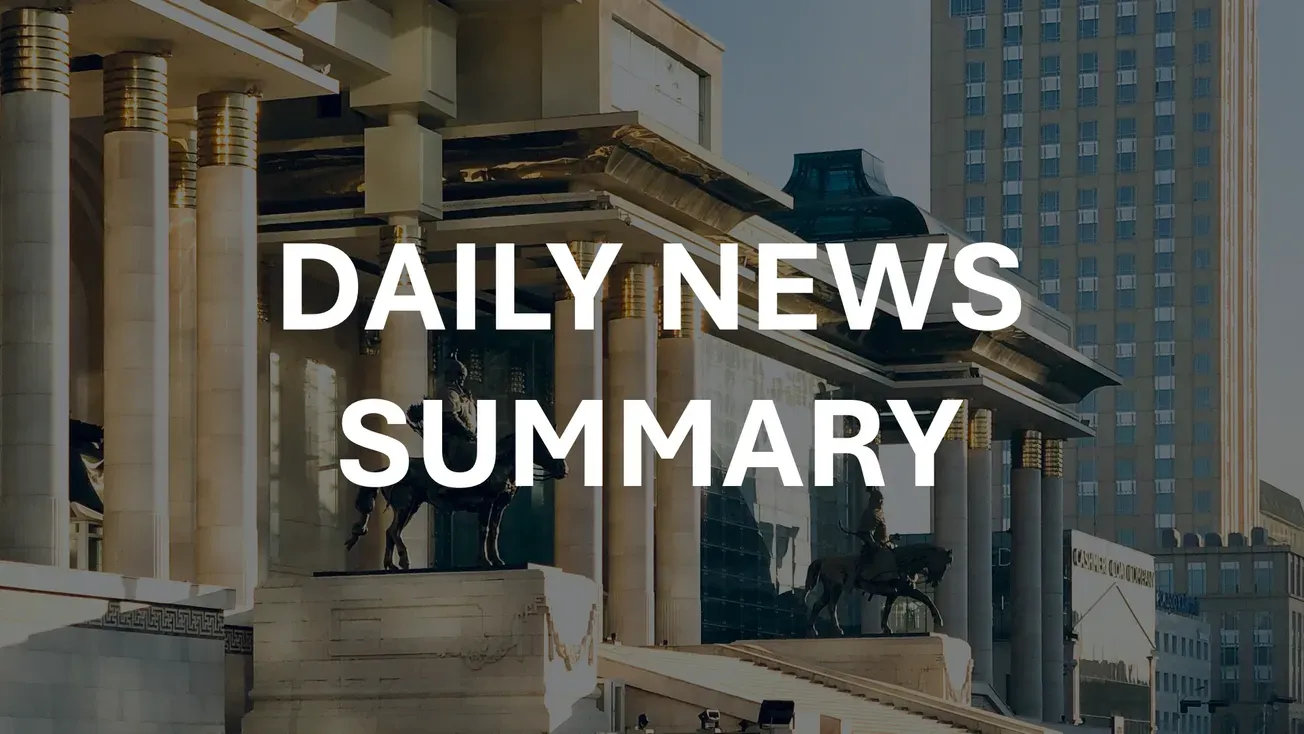This weekly digest showcases just 10 stories. Daily subscribers receive comprehensive intelligence briefs with 40 of the top stories organized by category. Don't miss the stories that matter.
Subscribe to Daily →
October 3, 2025 to October 9, 2025
This week's top 10 stories from Uzbekistan, selected from our daily intelligence briefs.
1. Mirziyoyev Pitches Security, Trade and Tech Blueprint at Gabala TDT Summit
At the Organization of Turkic States summit in Gabala on 6–7 October, President Shavkat Mirziyoyev outlined a wide-ranging integration blueprint aimed at deepening security, trade and tech cooperation across the Turkic bloc. Key proposals include convening the first joint meeting of foreign ministers and security chiefs in Samarkand, fast‑tracking a “Strategic Partnership, Eternal Friendship and Brotherhood” treaty, and creating a Permanent Economic Partnership Council with a project office in Tashkent. Mirziyoyev also put forward a 2030 strategy and concrete economic platforms — a Turkic Industrial Alliance, Turkic Investment Fund expansion, “Turkic Green Lanes” to harmonize technical regulations, customs digitalization and tariff optimization for the Middle Corridor — and connectivity links to the China–Kyrgyzstan–Uzbekistan railway and the Trans‑Afghan route.
He further proposed sectoral initiatives including a Green Transformation consortium, an organic agriculture expert group and single-brand exports, an AI and creative‑economy roadmap, a Turkic World Expo in Uzbekistan, and a new international Turkic university under the Turkic University Union. The package couples economic integration with joint counter‑extremism measures and cultural cooperation (a 2026 Nizami–Navoi conference), signaling Uzbekistan’s push — following prior OTS meetings in Bishkek (Nov 2024) and an informal summit in Hungary (May 2025) — to convert political alignment into operational projects that could reshape regional connectivity, finance and technology cooperation.
Local Coverage: anhor.uz, kun.uz, qalampir.uz, gazeta.uz, uzdaily.uz, uza.uz
From daily briefs: 2025-10-06, 2025-10-07, 2025-10-08
2. Allied Biofuels to Build $5.9B Sustainable Aviation Fuel Complex in Khorezm
Allied Biofuels (registered in Uzbekistan in July and led by CEO Alfred Benedikt) will invest $5.9 billion to build a fully integrated biomass-based sustainable aviation fuel (SAF) complex in Tuproqqal’a district, Khorezm region, Uzbekistan, following an agreement signed at the Khiva International Investment Forum with Governor Jo‘rabek Rahimov. The facility is planned as Central Asia’s first end-to-end biorefinery, using agricultural waste feedstock and supported by 2 GW of PEM electrolysis for hydrogen, with targeted annual outputs of 382,000 tonnes of SAF, 152,000 t of electro‑synthetic SAF (e‑SAF) and 11,000 t of renewable diesel.
The project is positioned to advance Uzbekistan’s announced carbon‑neutrality goals for 2030, create “hundreds” of skilled jobs and stimulate regional supply chains for feedstock collection, logistics and refining services; the regional administration has committed land and water allocations. Key commercial details—timelines, offtake agreements and regulatory incentives—were not disclosed, so realization risks remain tied to feedstock logistics, permitting, financing execution and market access as global SAF mandates tighten.
Local Coverage: anhor.uz, kun.uz, uzdaily.uz, gazeta.uz
From daily briefs: 2025-10-03, 2025-10-05, 2025-10-06
3. Sojitz to Invest $1 Billion in New Airport Project, per Nikkei Asia
Japan’s trading house Sojitz plans to invest $1 billion in a new airport project in Uzbekistan, Nikkei Asia reported (via Kun.uz). The announcement—unaccompanied by details on site, timeline or finance structure—signals growing Japanese corporate interest in Central Asian infrastructure and suggests a greenfield facility aimed at international passenger and logistics traffic.
A $1 billion commitment would align with Uzbekistan’s ongoing aviation modernization and public‑private partnership pipeline, potentially boosting regional connectivity, cargo throughput and downstream services (MRO, retail, tourism). No official Sojitz or Uzbek government statements have been published; the deal remains at the planning/negotiation stage.
Local Coverage: kun.uz
From daily brief: 2025-10-08
4. Record Boeing Deal and U.S. TNCs Deepen Role in Uzbekistan’s Modernization
Uzbekistan signed a landmark Boeing deal worth more than $8 billion — the largest aviation contract in the country’s history — to acquire Dreamliner 787s aimed at modernizing the national carrier, opening long‑haul routes and expanding maintenance and training capacity, a move the government says will generate jobs and support direct intercontinental services. The agreement comes as bilateral U.S.-Uzbek trade nearly doubled between 2021 and 2024 to $773.3 million in 2024, with Uzbek exports to the U.S. rising almost fivefold on the back of textiles, produce and select minerals, while imports remain dominated by high‑tech equipment, oil and gas machinery, pharmaceuticals and aviation products.
U.S. transnational corporations are deepening their local footprints to capitalize on and accelerate Uzbekistan’s economic transition: Honeywell is registering locally to push industrial digitalization, Air Products is advancing gas‑chemicals projects, Visa is scaling digital payments, and consumer giants Coca‑Cola and P&G are raising local consumer standards. Officials frame the inflow of higher‑tech imports and foreign investment as catalytic for technological upgrading and global competitiveness, signaling a strategic pivot toward higher‑value sectors even as the country expands its aviation and services connectivity.
Local Coverage: uza.uz
From daily brief: 2025-10-04
5. Navoiy Mining Plans 30% Gold Output Increase by 2030 with Annual $600m Investments
State-owned Navoiy Mining and Metallurgy Combine (NKMK) announced a development program in 2025 to boost gold output to about 4 million ounces by 2030—roughly a 30% rise over five years—backed by up to $600 million in annual capital expenditure. The plan signals sustained prioritization of gold as a strategic export and hard-currency earner for Uzbekistan and implies phased capacity upgrades and potential modernization of processing facilities, though NKMK has not disclosed detailed project breakdowns or financing sources.
For international investors and suppliers, the scale and cadence of the spending point to opportunities in mining services, equipment, and logistics, but realization will depend on regulatory stability, procurement timelines and execution risk. Market participants will watch clarifications on project phasing, funding arrangements and timelines as NKMK moves to implement the roadmap.
Local Coverage: kun.uz
From daily brief: 2025-10-10
6. UNGA Speech Showcases Reformist Foreign Policy and Regional Integration Drive
At the UN General Assembly’s 80th session, President Shavkat Mirziyoyev outlined a reformist foreign-policy agenda centered on recalibrating multilateral institutions and deepening Central Asian integration. Proposals include expanding the UN Security Council, aligning UN mechanisms with contemporary crises, launching ECOSOC/UNCTAD-led economic forums for Central Asia, and creating a UNIDO-backed regional hub for green industrial technologies. Tashkent also pushed for UN-supported transport and energy corridors through Afghanistan, programs on water management, afforestation and demographic stability, and measures to bolster logistics resilience for landlocked states.
Mirziyoyev reiterated calls for de‑escalation in Gaza under a two‑state framework and diplomatic engagement on Ukraine, while emphasizing regional counterterrorism cooperation. Analysts, including Sayfiddin Jo‘rayev of Tashkent State University of Oriental Studies, interpret the speech as signaling a strategic, results‑oriented pivot that positions Central Asia as a more assertive regional actor in international relations.
Local Coverage: uza.uz
From daily brief: 2025-10-06
7. Special Tax Regime Offers 5-Year Relief on Foreign-Sourced Income for Non-Residents from 2026
Uzbekistan will introduce a special personal income tax regime for qualifying foreign nationals effective 1 January 2026 under Presidential Decree No. PF-180 (4 Oct 2025), exempting foreign‑sourced income from personal income tax for up to five years. To qualify, applicants must hold or lease residential property in Uzbekistan, be present in the country at least 30 days within any rolling 12‑month period, register with the Tax Committee and a designated commission (reviews within five business days), and pay a one‑time levy of $50,000; each additional adult family member may join by paying $10,000. Approved applicants must open an account at an authorized Uzbek commercial bank or a crypto wallet with a licensed exchange; registration is processed in one day.
The measure is positioned to attract foreign talent, capital and fintech activity by formalizing a limited‑presence residency test and permitting crypto‑wallet use for compliance. It follows recent exemptions for foreign teachers and specialists in non‑state education (through 2030) and signals an ongoing policy push to ease tax and operational barriers for foreigners doing business or relocating to Uzbekistan.
Local Coverage: norma.uz, anhor.uz, gazeta.uz, kun.uz, uzdaily.uz, uza.uz
From daily briefs: 2025-10-08, 2025-10-10
8. Mitsubishi Explores New Energy and PPP Investments After Talks in Tashkent
On 7 October, Uzbekistan’s Ministry of Investment, Industry and Trade held talks with a Mitsubishi Corporation delegation led by CEO Juro Baba, chaired by Deputy Minister Ilzat Kasimov, to accelerate energy projects and design new public–private partnership (PPP) frameworks. The discussions signalled mutual interest in identifying investment directions across energy and industrial sectors; potential PPPs with Mitsubishi — one of Japan’s largest multinationals reporting $6.9 billion net profit in 2024 and employing about 62,000 people — could support grid modernization, generation capacity expansion and industrial upgrading while creating bankable structures for foreign capital deployment.
Separately, Japan’s Okamoto Corporation is exploring joint textile projects and possible localisation after talks in Tashkent with Deputy Minister Kasimov, including opening a representative office and incentives for investors. Okamoto, with annual exports exceeding $100 million and regional operations in Japan, China and Thailand plus U.S. distribution links to Walmart, Amazon and Costco, could help Uzbekistan scale textile production, adopt advanced technology and diversify supply chains — reinforcing broader Japan–Uzbekistan industrial cooperation with concrete implementation steps under consideration.
Local Coverage: uzdaily.uz
From daily briefs: 2025-10-08, 2025-10-09
9. Jizzakh Nuclear Project Advances with Mixed Fleet and Fuel Deals Announced in Moscow
Uzbekistan and Russia’s Rosatom have agreed to develop an integrated “2+2” nuclear power complex in Jizzakh combining two 1,000 MW VVER‑1000 units with two 55 MW RITM‑200N small modular reactors on a single 525‑hectare site, aiming to start implementation in 2026 and sign key contracts by year‑end. The plant is projected to produce about 15.2 billion kWh annually by 2035—roughly 15% of current Uzbek demand—and is presented as part of a strategy to push “clean” energy above 40% by 2030; construction is expected to create some 12,000 jobs and a new “Atom City” district, with workforce training supported via a Tashkent MIFI branch.
Agreements reached at the Global Atomic Forum formalize reactor configuration and fuel‑supply terms, including use of the RITM‑200N design adapted from Russian icebreaker technology and amendments to a 2018 intergovernmental deal. Officials frame the hybrid large‑plus‑SMR layout as a global first that will enhance grid stability and renewables integration; the project leverages Uzbekistan’s uranium production (over 3.5 kt annually) and deepens bilateral nuclear cooperation, raising commercial, regulatory and geopolitical considerations as contracts and implementation proceed.
Local Coverage: kun.uz, qalampir.uz, uza.uz
From daily brief: 2025-10-05
10. Standards Overhaul Advances WTO Accession, Targets 45% Alignment by Year-End
Uzbekistan is fast-tracking regulatory reform to support its World Trade Organization accession, revising the Law on Standardization with international experts to comply with WTO and Technical Barriers to Trade (TBT) rules and overhauling technical regulation and certification frameworks. Authorities report adopting 1,739 international standards in 2024, raising alignment from 24.2% in 2023 to 30.6% this year, with 12,958 standards harmonized overall (39.6%). Officials aim to reach 45% alignment by year-end—and 40% in 2025—through an additional 1,700 adoptions and a sectoral roadmap covering 2,590 standards for industry and services.
Complementary measures include establishing a TBT Information Center to manage post‑accession exchange of product and service requirements. The package is designed to ease market entry, bolster China-focused trade and technology ties, and enhance economic sovereignty, signaling a pragmatic push to align domestic regulation with international norms ahead of WTO membership.
Local Coverage: uza.uz
From daily brief: 2025-10-08
About This Weekly Digest
The stories above represent the most significant developments from Uzbekistan this week, selected through our AI-powered analysis of hundreds of local news articles.
Stories are drawn from our daily intelligence briefs, which synthesize reporting from Uzbekistan's leading news sources to provide comprehensive situational awareness for international decision-makers.
These weekly highlights are a small sample of what's happening. Daily subscribers get comprehensive briefings with 40 top stories that connect the dots between events, track developing stories, and provide the context you need for informed decision-making.
Upgrade to Daily →
